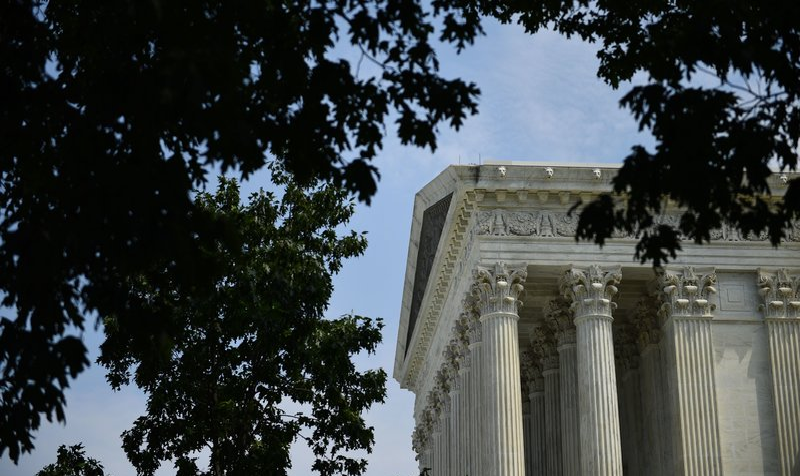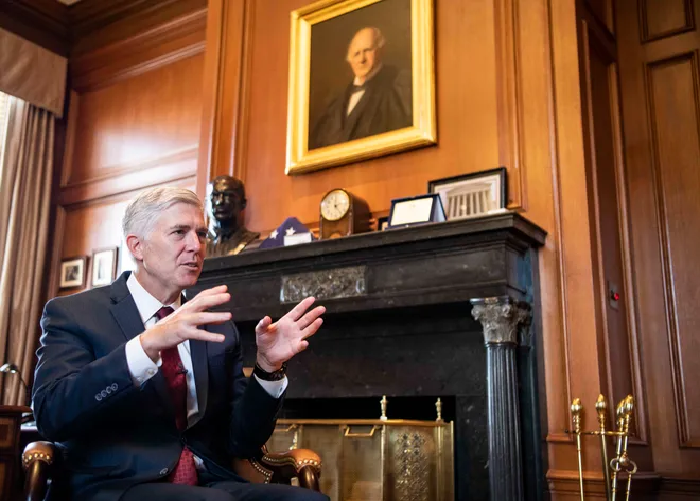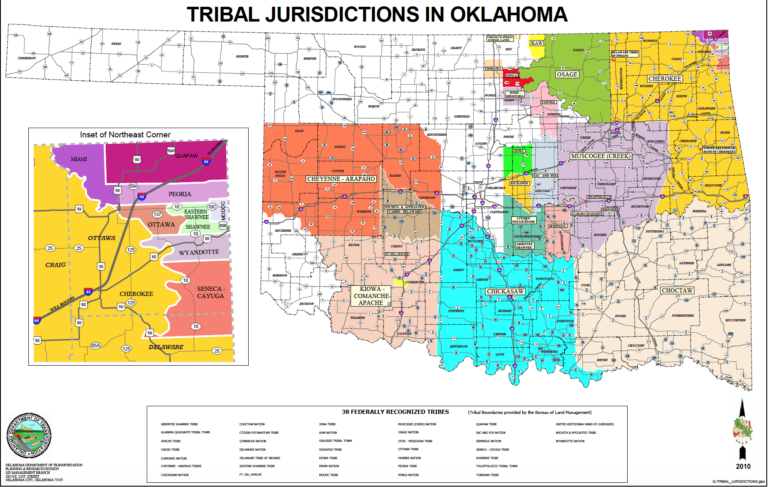 |
|
The Supreme Court ruled Thursday that about half of the land in Oklahoma is within a Native American reservation as stated in treaties. Brendan Smialowski/AFP via Getty Images |
The US Supreme Court on July 9 recognized about half of Oklahoma as Native American reservation land and overturned a tribe member’s rape conviction because the location where the crime was committed should have been considered outside the reach of state criminal law.
The justices ruled 5-4 in favor of a man named Jimcy McGirt and agreed that the site of the rape should have been recognized as part of a reservation based on the historical claim of the Muscogee (Creek) Nation – beyond the jurisdiction of state authorities, Reuters reported.
The decision means that for the first time much of eastern Oklahoma is legally considered reservation land. More than 1.8 million people live in the land at issue, including roughly 400,000 in Tulsa, Oklahoma’s second-largest city.
Conservative Justice Neil Gorsuch wrote the ruling, joining the court’s four liberals in the majority.
Gorsuch referenced the complex historical record that started with the forced relocation by the US government of Native Americans, including the Creek Nation, to Oklahoma in a traumatic 19th century event known as the “trail of tears.” At the time, the US government pledged that the new land would be theirs in perpetuity.
“Today we are asked whether the land these treaties promised remains an Indian reservation for purposes of federal criminal law. Because Congress has not said otherwise, we hold the government to its word,” Gorsuch wrote.
Gorsuch rejected the state’s arguments, which he said would require turning a “blind eye” to the federal government’s past promises.
In a joint statement, the state, the Creek Nation and the other four of what is known as the “Five Tribes” of Oklahoma said they were making “substantial progress” toward an agreement on shared jurisdiction that they would present to the federal government. The other tribes are the Cherokee, Chickasaw, Choctaw and Seminole.
The Nations and the state are committed to implementing a framework of shared jurisdiction that will preserve sovereign interests and rights to self-government while affirming jurisdictional understandings, procedures, laws and regulations that support public safety, our economy and private property rights, the statement said.
 |
| Supreme Court Associate Justice (Photo: USA Today) |
Tribe members exempt from certain state obligations
Unless changes are made, tribe members who live within the boundaries would now become exempt from certain state obligations such as paying state taxes, while certain Native Americans found guilty in state courts would be able to challenge their convictions on jurisdictional grounds. The tribe also may obtain more power to regulate alcohol sales and expand casino gambling.
The ruling voided McGirt’s sentence of 1,000 years in prison but he could face a new trial in federal court rather than state court.
Under US law, tribe members who commit crimes on tribal land cannot be prosecuted in state courts and instead are subject to federal prosecution, which sometimes can be beneficial to defendants. Reservations were established beginning in the 19th century after US authorities expelled Native Americans from their traditional lands.
McGirt, 71, has served more than two decades in prison after being convicted in 1997 in Wagoner County in eastern Oklahoma of rape, lewd molestation and forcible sodomy of a 4-year-old girl. McGirt, who did not contest his guilt in the case before the justices, had appealed a 2019 ruling by a state appeals court in favor of Oklahoma.
McGirt is a member of the Seminole Nation. The crime occurred on land historically claimed by the Creek Nation.
In his appeal, McGirt argued that only the federal government should be allowed to prosecute his case, CNN reported.
Far-reaching consequences
The case has far-reaching consequences for hundreds of charged and incarcerated people who have been found to have committed crimes on the land.
Justice Ruth Bader Ginsburg expressed this concern during oral arguments, telling McGirt’s lawyer, “What makes this case hard is that there have been hundreds, hundreds of prosecutions, some very heinous offenses of the state law. On your view, they would all become undone,” CNN reported.
A reservation is land managed by a tribe under the federal Bureau of Indian Affairs and generally exempt from state jurisdiction.
 |
| COURTESY, Oklahoma Department of Transportation. |
Trump administration takes the state’s side
Within hours of Thursday’s ruling, the state and five Native American nations released a statement promising cooperation, according to USA Today.
“The nations and the state are committed to implementing a framework of shared jurisdiction that will preserve sovereign interests and rights to self-government while affirming jurisdictional understandings, procedures, laws, and regulations that support public safety, our economy, and private property rights,” they said. “We will continue our work, confident that we can accomplish more together than any of us could alone.”
Many Oklahoma public officials, including Republican Rep. Tom Cole and former Democratic Gov. Brad Henry, had urged the justices to rule in favor of the Native American tribes whose sovereignty they said has been good for the state.
“In one area after another – taxation, gaming, motor vehicle registration, law enforcement, and water rights – the Nations’ sovereignty within their reservations and the state’s recognition of that sovereignty have provided the framework for the negotiation of inter-governmental agreements that benefit all Oklahomans,” they said.
The Trump administration took the state’s side, telling the justices that Congress long ago broke up the Creek Nation’s lands, abolished its courts and set a timetable for the tribe’s dissolution.
Last year, 10 states from Maine to Texas to Montana warned that the boundaries of tribal lands have jurisdictional consequences there as well. They said a decision in the tribe’s favor “would be confusing and costly at best, and disastrous at worst,” affecting health and energy policy, environmental regulation, economic development and taxes./.



